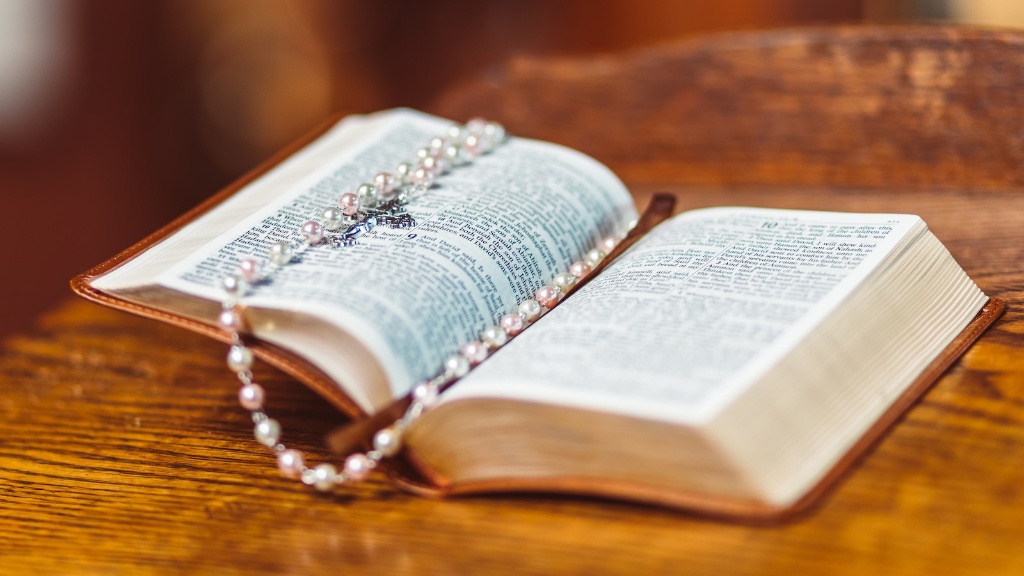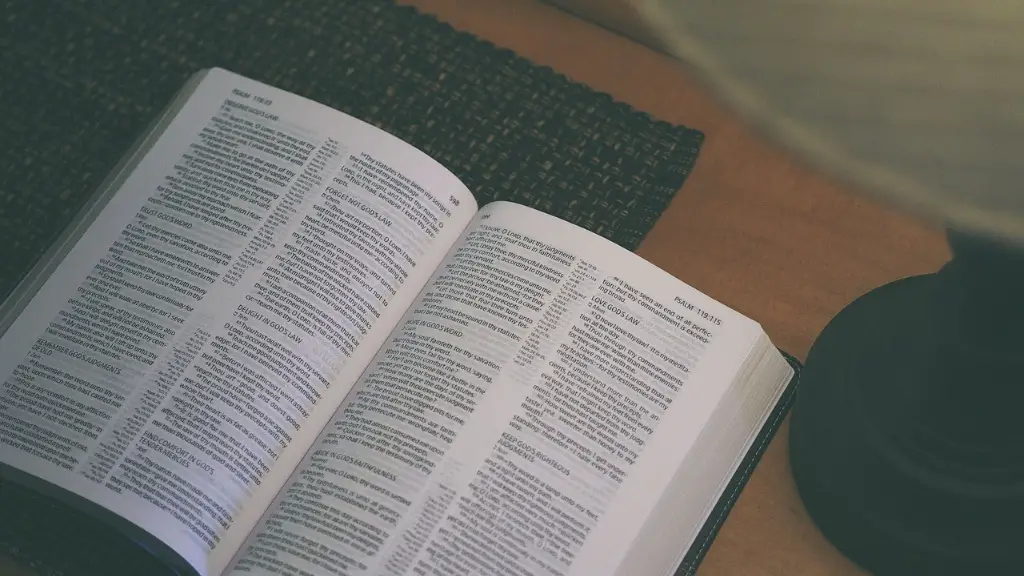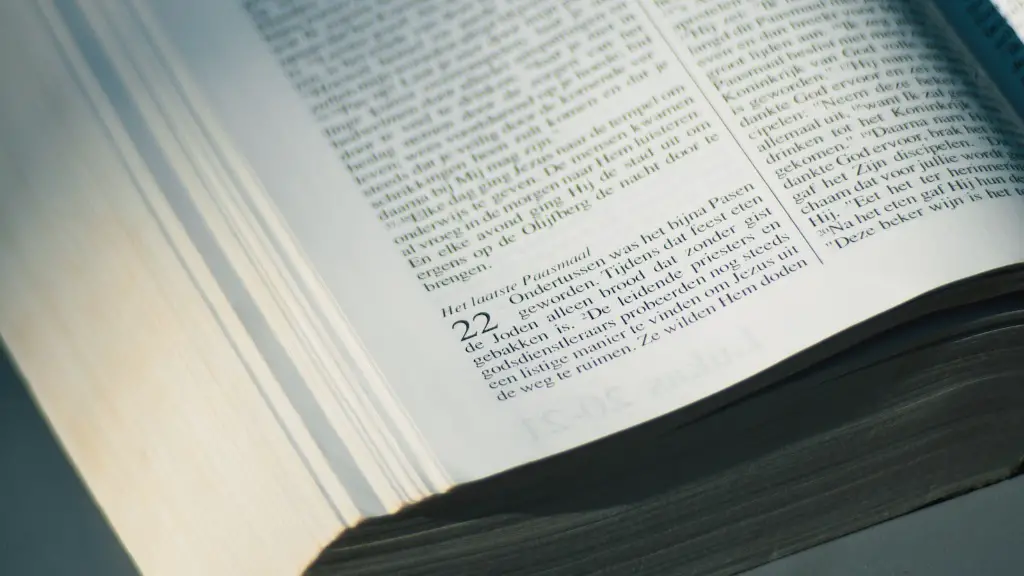Overview
The Bible addresses the concept of the resurrection of the body in many ways, with one of the most prominent being the belief that those that have been cremated will one day be able to rise again. This is an important topic for many people, as some may want to honor the wishes of their loved ones in regards to final resting place, but may not want to deny them the chance to rise again. Through many interpretations, some take the Bible’s words literally, while others look to indepth theological analysis and symbolism to come to a conclusion on whether or not cremated bodies can rise.
Biblical Passages and Interpretations
The Bible repeatedly exhorts humans to ‘return to dust’ after death, with some implying that this must take physical form in order for a body to be resurrected and ascend to Heaven. One of the notable passages is in Genesis 3:19: “In the sweat of thy face shall thou eat bread, till thou return unto the ground; for out of it wast thou taken: for dust thou art, and unto dust shalt thou return.” This verse appears to be instructing readers to follow a literal path and not cremate the body after death.
However, many theologians and scholars differ in their interpretation of such passages. Some argue that since the Israelites had no knowledge of cremation at the time these verses were written, the meaning of the Bible is broader than suggested. There is an argument that those believing in cremation and the chance of resurrection can look to other passages in the Bible which point towards a much broader interpretation. John 11:25-26 is often pointed to, where Jesus spoke of a belief that even those who experience death will eventually be resurrected.
Modern Cremation
In more recent years, cremation has become more commonplace and accepted. While some traditions and religions still forbid it, there is a general acceptance among many faiths that cremation is a viable resting place, and still allows the chance of resurrection. With the cost of burials becoming increasingly expensive, this has greatly impacted the amount of people opting to choose cremation over burial. This has meant many people have begun to investigate the possibility of being cremated and still being able to rise again.
In the Cathloic Church, there is a stance that allows cremation to take place, as long as there is no suggestion that the person does not believe in the resurrection of the body. While this is accepted by many in the Church, some still prefer to bury the body with the belief that it must be present in physical form for the resurrection to take place. This goes back to the literal interpretation of the Bible, where the belief is that cremation denies the body the chance to be resurrected.
Conclusion or Acceptance?
The debate around the verse from Genesis has meant opinions are varied on the desired conclusion for this discussion. Many theologians suggest a reinterpretation of verses that take into account greater understanding. This is paralleled by the stance taken by the Catholic Church, who suggest that cremation is permissible as long as there is a belief in the resurrection. There has been an increasing acceptance of cremation and the potential for a body to still rise that has come hand in hand with technology and greater understandings.
At its heart, this conversation is deeply personal and spiritual, as the decision not to cremate a body has powerful implications to a person’s faith and beliefs. It is ultimately up to each individual to decide which type of resting place they should choose and how to best practice their faith and belief.
What the Bible Says About Death
In the Bible, death is seen as a physical ending but with a spiritual, afterlife to come. Ecclesiastes 9:10 reads ” Whatsoever thy hand findeth to do, do it with thy might; for there is no work, nor device, nor knowledge, nor wisdom, in the grave, whither thou goest.” This implies that our physical state matters not when we pass away and that the afterlife is an ethereal concept.
Isaiah 25:8 also speaks of the afterlife, with the promise that death will be swallowed up in victory, suggesting that those that are cremated are included in that victory. Job 19:25-27 explains further by stating that although the body will die, our wishes and desires will be resurrected again.
Can the Body Rise Again After Cremation?
The overall conclusion when it comes to the possibility of a cremated body rising again is that in most cases, the belief that a body will rise again is possible regardless of how it has been buried. The Bible speaks of the afterlife in metaphoric and symbolic language, with some passages implying a literal interpretations.
Although certain religions may take a more literal interpretation, most theologians and scholars will suggest that the Bible’s message is sufficiently open to interpret that a cremated body can rise again. The main factor is the spiritual belief of the indiviudal and the belief that death is only the beginning of the afterlife, rather than the end.
Traditional Funerary Practices
Many traditional funerary practices have heavily emphasized burials and have outlined detailed guidelines as to what should happen when a loved one passes away. In many of these traditions, the body needs to be buried, rather than cremated, in order for the spirit to ascend to Heaven. For many in these traditional cultures, the process of burial is very important in honoring their ancestors and the spiritual traditions of their faith.
However, with greater access to education and understanding, many from these traditions now accept that burial does not necessarily prevent a body from rising again. An understanding that death is a physical terminal point, with a spiritual resurrection awaiting those that have faith is a common theme in many traditional funerary practices.
Modern Practices and Beliefs
Modern funeral practices have also been impacted by technological and social changes. This has led to cremation becoming an increasingly socially accepted practice, with many governments providing incentives to families to cremate over a burial. The cost savings associated with cremation is often a primary motivator for this decision.
However, despite the increased use of cremation, the belief in the resurrection of the body still stands whether the body has been buried or cremated. The greatest impact on the afterlife is the spiritual beliefs of the individual and the fact that death is the transition from physical life to spiritual life.
Finding Comfort and Closure
When facing the death of a loved one, it is important to find comfort and closure in their passing. No matter the beliefs around cremation and the afterlife, the truth is that each individual will have to make the decision for themselves. It is important to also accept that no single belief system is perfect or wrong, and that it is up to each individual as to how they wish to celebrate the life and legacy of their loved ones.
For those struggling with the decision of whether they should cremate a loved one, it is important to remember that what matters most is the spiritual belief of the individual. As long as this is strong and resolute, then this can help bring comfort and closure to the grieving process.
Religious Guidelines
In many religious circles, guidelines on cremation have been outlined and in some cases, cremation is actually encouraged. Some Judaism and Islamic burial customs actually require that the body be buried so as to be able to rise again. However, in many other religious circles, cremation is accepted as long as there is a belief in the resurrection of the body.
Ultimately, the conclusion of whether a body can be cremated and still be able to rise again is highly dependent on each individual’s faith and beliefs. In most cases, religious leaders and theologians suggest that a cremated body is still able to rise again, and that is the same for those that are buried. Both options are permissible, so long as the individual believes in the resurrection of the body.
Pros and Cons of Cremation
When looking at cremation there are some positives and negatives to consider. On the positive side, cremation typically is more cost effective than a burial, and it also allows people to honor the wishes of their loved ones by allowing them to have a smaller footprint on the planet. Some religious groups also now accept creamtion and some even encourage it.
On the downside, some argue that cremation prohibits the physical body from rising again, however this is not unanimously accepted. Furthermore, some argue that cremation does not deem the body the same respect that a traditional burial does, and some argue that it does not allow for the same mourning period to take place.
Conclusion or Acceptance?
The conclusion here is that there is still much debate around this topic, and the interpretation of Bible passages on the subject is varied. Ultimately, the decision of whether or not to cremate remains a personal one, and the effect of that decision on the ability of a body to rise again is highly dependent on the beliefs of the individual. It is important, therefore, that each person takes the time to contemplate the decision and to make sure that whatever decision is made, it is in line with their own beliefs around death and resurrection.





